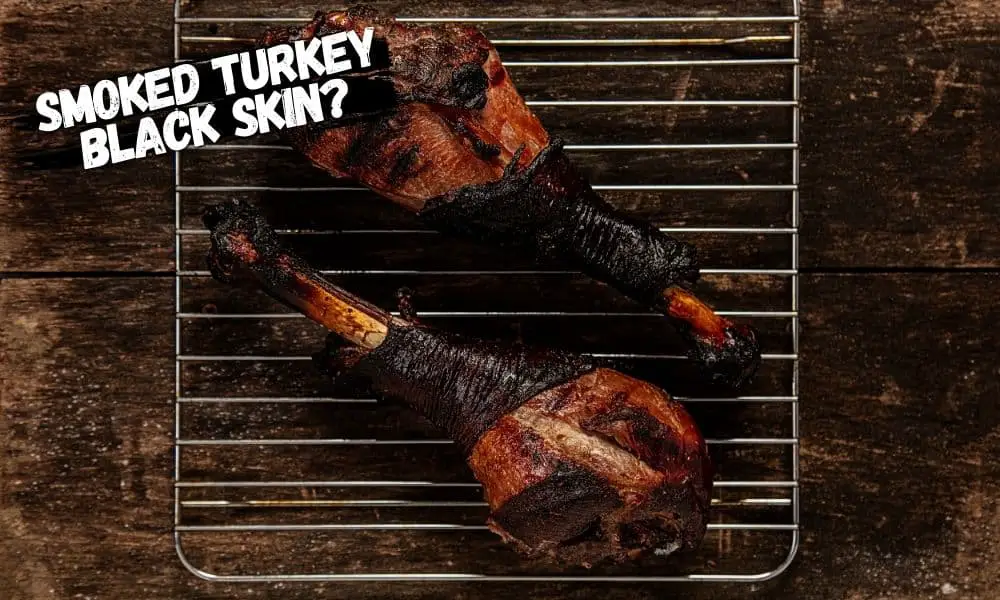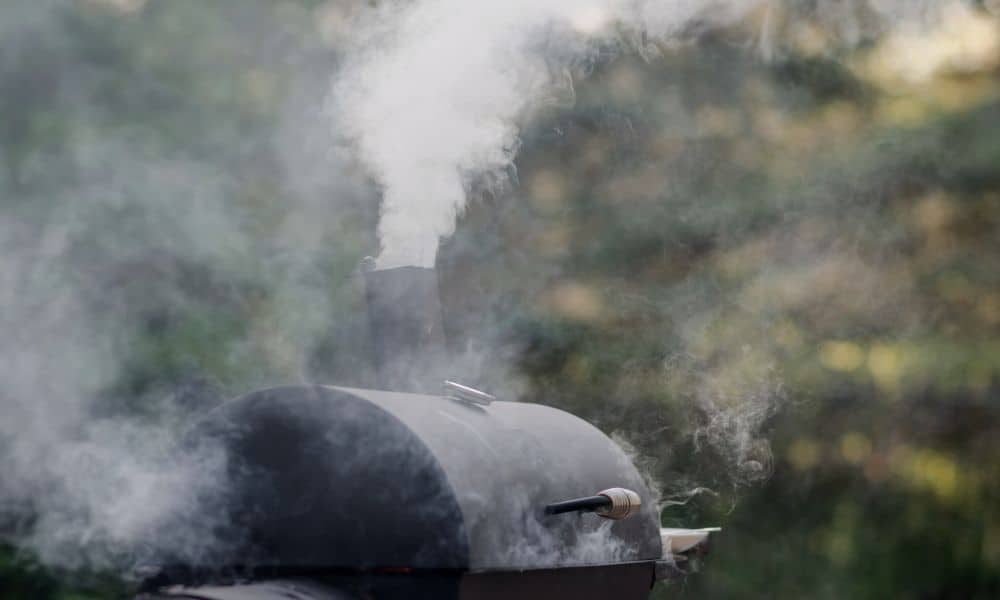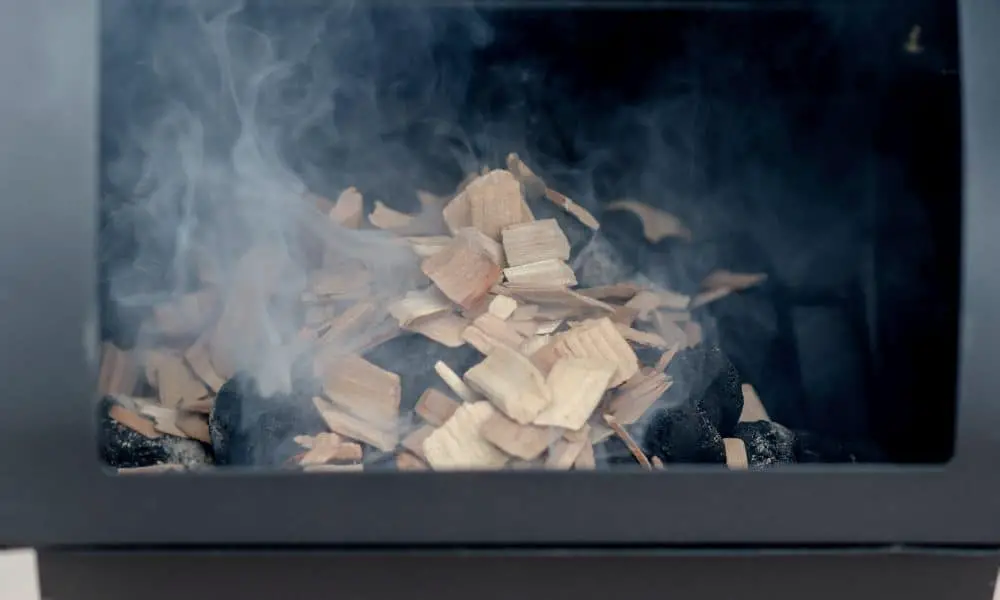I’m sure most of us have had a time when we’re smoking a turkey and the skin has come out distinctly black. Not golden, not mahogany, but black.
Here’s how it usually goes.
After the first hour, you’re thinking your smoked turkey is coming along nicely. By the second hour, you’re thinking, wow the turkey skin looks a nice brown already! And by the third or fourth hour, you’re starting to question just how dark this turkey’s going to get!
Here’s exactly how smoked turkey can become black and what you can do next time to avoid it entirely.

Just to preface, even if your smoked turkey has come out black, it’s generally safe to consume – but you may want to remove the skin!
Still, it can be quite hard to explain to your guests how the turkey ended up so clearly black!
The most common reasons why your smoked turkey has come out black is from too much sugar in the rub, too much smoke, dirty smoke, or your temperature was too high.
Luckily, it’s normally just the skin that is affected. The meat normally remains moist and flavorful!
Nonetheless, they are a few key steps you can take to prevent your smoked turkey from coming out black.
What Causes Turkey Skin to Go Black?
Instead of jumping straight to the tips for preventing black smoked turkey, it’s much more effective to understand what’s causing the turkey skin to go black in the first place.
Here, you can identify what might have happened during your smoking session, and fix it for next time!
The Malliard Reaction
No matter what caused your turkeys skin to become black, a bit of the darkness will always be contributed by the Maillard reaction.
Without spurting technical jargon at you, the Maillard reaction is simply a process that takes place between proteins and sugars. It’s the magic behind the bark formation process, and even behind the crispy sear on a steak.
Of course, this isn’t actually a bad thing. After all, you want your turkey’s skin to come out a nice mahogany golden brown color.
Appearances matter after all!
However, the Maillard reaction, together with either too much sugar in the rub, too much smoke or dirty smoke, or too high of a temperature can cause a blackening on the turkey.
Too Much Sugar In The Rub
Everyone loves a bit of sweetness. It’s a common flavor profile to use in barbecue, to offset the deep savory flavor of the meat and the smokiness from the wood.
However, too much sugar in any dry rub, whether it’s brown sugar or white sugar, can cause the turkey skin to get far too dark.
If you’ve used too much sugar in your rub, a combination of the sugar caramelizing and burning, and the Malliard effect can cause your smoked turkey to become black.
Too Much Smoke

Just like it’s entirely possible to not have enough smoke, it’s entirely possible to have TOO much smoke.
In the world of barbecue, smoke is always seen as a good indication. After all, you want to know your food is indeed absorbing that incredible smokiness.
However, when meats like turkey are exposed to TOO much smoke, they can quickly easily become “over smoked”.
In the case of a turkey, too much smoke can cause an unnatural blackening of the turkey’s skin.
To combat this issue you should always be wary of how much wood you’re actually adding to your smoker and how hot it’s actually burning.
Tip: Cherry wood is known to cause a bit of extra darkening on the turkey skin too!
Dirty Smoke
Dirty smoke is very different from simply providing the turkey with too much smoke.
Dirty smoke simply refers to the smoke that contains unwanted byproducts and is caused by incomplete combustion of wood, or burning wet woods or soft woods. It can even come from other debris, grease, or soot build-up in your smoker!
This is normally signaled by white bellowing smoke, or smoke producing an odd smell. But, it can just as easily look like normal smoke too!
Dirty smoke often carries byproducts that cause the turkey or other meat to turn dark brown or black.
High Temperature
When you smoke turkey at too high of temperatures, one of two things normally happens.
Either the high temperature actually causes charring on the dry turkey skin, making it distinctly black.
Or, the high temperatures cause the wood to burn too hot and produce dirty smoke, in turn making your smoked turkey black.
That’s why it’s essential to keep your smoker below about 350°F. Normally 275°F is a good temperature for smoking turkey, whether it’s whole, pre-cooked, broken down, or spatchcocked.
If you’re experiencing temperature fluctuations, you can opt to use a water pan to help anchor the ambient temperature of your smoker.
Preventing Black Smoked Turkey
So, after you’ve diagnosed the most likely reason your smoked turkey came out black, you can simply adjust your approach for next time.
However, there are some other steps you can take as extra precautionary measures. Plus there are some methods that will actually prevent the smoked turkey skin from going black entirely.
Here’s what you can do.
Clean Out The Smoker
Sounds simple, doesn’t it?
But, one cause of dirty smoke is debris, soot, or grease build-up in your smoker.
The easiest way to eliminate this is to give your smoker a good clean, from the vents, to the vessel, to the charcoal pit, and to the grates.
The more regularly you tend to your smoker, the fewer problems you’ll have with it.
Take It Easy With Sugary Rubs
A lot of commercial rubs contain brown sugar to add a distinct sweetness.
Although this brown sugar is happily absorbed into other traditional barbecue meats like brisket or pork butt, it can have a distinctly different effect on turkey.
That is, too much brown sugar will often lead to dark-skinned turkey. Together with the Maillard reaction your turkey can quickly become black.
You can still dry brine or dry brine, but you may want to choose a low-sugar binder for smoking your turkey.
Keep An Eye On The Temperature

The higher the temperatures, the more likely your turkey skin will char or burn, and the more likely your wood will start producing less-desirable smoke.
Both these factors can quite easily lead to a black smoked turkey.
You can easily smoke turkey between 225°F – 325°F without any problems, but any higher than about 350°F you’re in black turkey territory.
Tip: between 275-325°F is recommended for crispy skin, without going rubbery and without burning.
Finish Your Turkey In The Oven
Even if your smoker hasn’t run out of fuel, finishing your turkey in the oven after it’s been smoked can be a great way to retain more moisture in your turkey and prevent too much smoke from turning your turkey black.
Don’t worry, so long as your turkey has been in the smoker for an hour or two it will have absorbed sufficient smokiness to satisfy any barbecue lover.
Plus, by finishing your smoked turkey in the oven, you can more easily control the temperature, keeping things moist AND looking a nice crispy golden brown as opposed to black!
Try A Foil Tent
With a similar thought in mind as finishing turkey in the oven, after you’re satisfied with the color and crispiness of your turkey skin, you can simply cover it in foil for the remainder of the cook.
This locks in the moisture, prevents too much smoke from being absorbed into the turkey skin, and helps things cook a little faster.
Although this certainly isn’t necessary for preventing black smoked turkey, it can help if you’re really having trouble, and want to maximize the juiciness of the turkey.
Can You Still Eat Black Smoked Turkey?
Just because the skin is black doesn’t mean that the meat won’t be delicious.
However, depending on how black the turkey is you may be able to taste the bitterness in the meat caused by creosote in the wood smoke.
So, if the skin is really black or otherwise unpalatable, simply remove the blackened parts of the skin or remove it entirely and just serve the meat!
Recap
In the normal process of smoking turkey, it’s not uncommon for the skin to turn a nice dark brown, or mahogany color. This is primarily due to the Maillard reaction.
However, it’s not considered normal for your turkey skin to come out black!
Black turkey skin is normally caused by too much sugar in the rub, too much smoke, or dirty smoke.
Once you’ve identified the culprit, make some adjustments accordingly. If you’re still odds and ends, you can choose to finish your turkey in the oven, or wrap it in a foil tent to prevent any further darkening of the skin!

